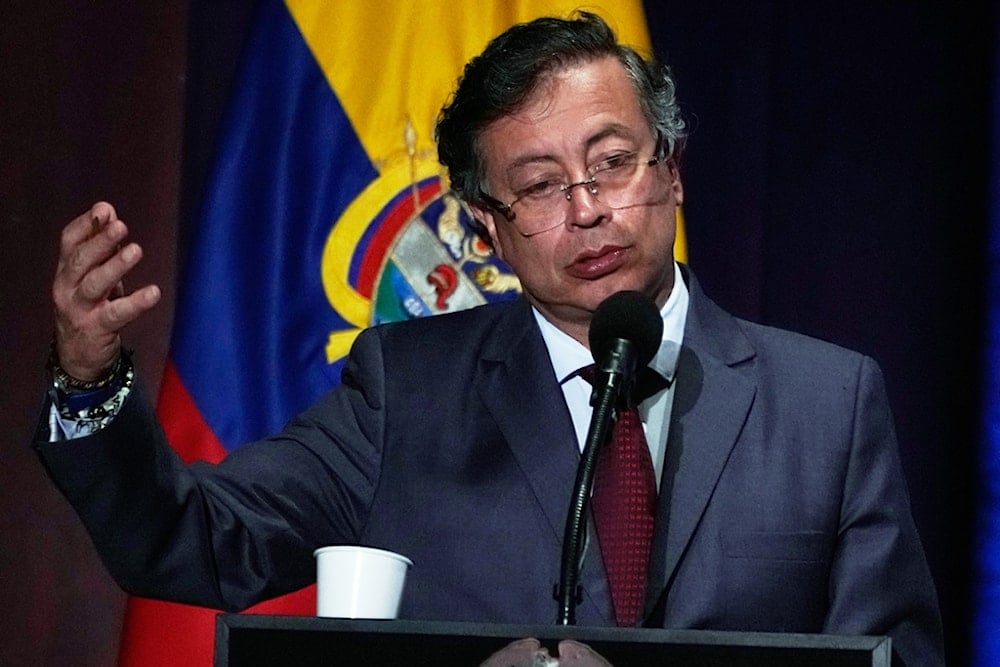Petro: Oil is key to US pressure on Venezuela, not drug trade
Colombia's president says Venezuela's resources, not drug trafficking, drive US policy on the nation amid sanctions and military escalation.
-

Colombia's President Gustavo Petro speaks at a ceremony marking the ninth anniversary of the signing of a peace deal between the state and the Revolutionary Armed Forces of Colombia (FARC), in Bogota, Colombia, Wednesday, November 26, 2025 (AP)
As US military activity increases across the Caribbean and Pacific, Colombian President Gustavo Petro has accused the Trump administration of using pressure on Venezuela as a pretext to gain access to its oil reserves.
“(Oil) is at the heart of the matter,” Petro told CNN in an exclusive interview, noting that Venezuela has the largest oil reserves in the world.
“So, that’s a negotiation about oil. I believe that is (US President Donald) Trump’s logic. He’s not thinking about the democratization of Venezuela, let alone the narco-trafficking,” he added, asserting that Venezuela plays a minor role in the global drug trade.
Read more: Chevron to boost Venezuela oil exports to 7-year high amid US shift
Oil reserves, not drugs, seen as US priority
Petro argued that Venezuela's oil reserves are central to US policy, not concerns about alleged drug trafficking in Colombia or the region. He stated that only a small fraction of the global drug trade flows through Venezuela and that the country is not considered a major drug producer.
On Tuesday, Petro accused the US of imposing its will on neighboring countries, comparing its actions to imperialism. “The United States cannot be considered an empire, but one of the nations among others,” he said.
In response, a US State Department spokesperson said the Trump administration remains “firm in its counter-drug operations in the Caribbean and its commitment to protecting Americans from the (Venezuelan President Nicolás) Maduro regime’s deadly poison.”
Tensions grow between Trump and Colombian president
Petro’s criticism reflects broader tensions between Bogotá and Washington. In the past year, he condemned the Trump administration’s immigration policies, its support for "Israel", and its expanding military footprint in Latin America.
He also referenced a personal confrontation, stating that after calling on US troops to disobey Trump at the UN General Assembly, his visa was revoked. “My message is the one they give to all members of the United States special forces: Your function, as they say in the oaths, is to fight against oppression. I repeated that on the streets in the United States, and it also cost me,” he said.
Read more: Leaked contracts reveal long-term US buildup near Venezuela
US sanctions on Colombia escalate
In October, the US Treasury sanctioned Petro, accusing him of involvement in the global drug trade, an accusation he categorically rejected.
The sanctions came shortly after Trump announced he would halt all US payments and subsidies to Colombia, accusing the Colombian president of failing to control drug production.
Petro defended his record, telling CNN that his administration had seized more cocaine than any previous government. “So much so that in recent years, I have managed to ensure that the growth in crops, which is stagnating, is far surpassed by the growth in seizures,” he said.
Asked why Trump refused to acknowledge this, Petro said, “Because of pride. Because he thinks I’m a subversive thug, a terrorist, and things like that, simply because I was a member of the M-19.”
Read more: Petro accuses US' Marco Rubio of plot to jail him
Furthermore, he stated that he does not see evidence linking the Venezuelan president to drug trafficking.
The Colombian president told CNN that “no Colombian investigation … has shown us a relationship between Colombian drug trafficking and Maduro.”
According to the United Nations Office on Drugs and Crime, Venezuela does not appear on cocaine production maps. The US Drug Enforcement Agency reached similar conclusions, reporting in March that 84% of the cocaine seized in the US originates in Colombia.
US defends action against Maduro, Petro
This week, the US designated the Cartel de los Soles, a term referring to Venezuelan officials allegedly involved in drug trafficking, as a "foreign terrorist organization." Venezuela has denied the claim, with experts stating that the term is more a description of governmental corruption than an organized group.
Petro’s comments come as Colombia-Venezuela-US relations continue to strain under diplomatic pressure, sanctions, and accusations of corruption.
Read more: US signs off on covert CIA operations inside Venezuela: NYT
Historical links to drug trafficking addressed
Petro acknowledged long-standing ties between Colombian officials and drug trafficking networks, saying they existed before he came to power. His remarks followed a report by Noticias Caracol, which alleged that senior Colombian military and intelligence officials had aided dissident FARC members.
Petro has denied involvement in the reported activity. The US State Department urged Colombian institutions to “thoroughly investigate these allegations and take all appropriate actions.”
Despite political tensions, the United States continues to regard Colombia as a key strategic ally. In 2022, the Biden administration named the country a “major non-NATO ally.”
US Secretary of State Marco Rubio stated the administration’s criticism is focused on Petro, not Colombian institutions.
“Our relationships with the people of Colombia, the economic sector of Colombia, the majority of people in politics in Colombia, and their institutions, in particular their defense institutions, are strong and enduring, and they’re going to be strong and enduring long after this individual is no longer the president there,” Rubio said.
Read more: Petro renews call for Gran Colombia union to unify Latin America

 5 Min Read
5 Min Read








